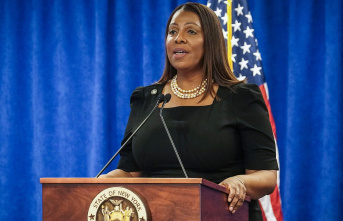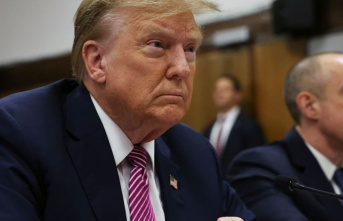It sounded like a promise. The crowd in front of the speaker registered them happily and obviously didn't think anything of it. If he is elected, said Tim Michels, Republican nominee for governor of the US state of Wisconsin, his party will "never lose another election" in that state.
To those concerned about the state of democracy in the US, that sounds like a threat. Because Tom Michels is a protégé of Donald Trump. He supports his narrative that Trump's 2020 election was "stolen" and that Joe Biden is not a legitimately elected president. As is well known, all attempts to prove or even to construct electoral fraud failed.
But that doesn't bother conservatives like Tom Michels. In interviews, he left open whether he would acknowledge a loss to his Democratic rival Tony Evers in the Nov. 8 midterm elections. And he created the impression that as governor-elect, he might not certify the victory of a Democratic presidential nominee in his state. The polling site FiveThirtyEight predicts an extremely close race for the governorship in Wisconsin, and close election results are predestined to be doubted - justified or not.
"The cancer that former President Trump injected into our electoral system has spread to any number of candidates for important positions in 2022," Fred Wertheimer fears. The 83-year-old is the founder and head of the non-profit organization Democracy 21, which has been fighting the influence of private money in US politics since 1997 - and is committed to fundamental reform. From Wertheimer's point of view, however, the financing of the election campaign is not the biggest problem of the US electoral system at the moment. "There is a great danger that Trump's 'big lie' will spread to states across the country," Wertheimer told the Guardian. It is to be expected that those who refuse to vote will not accept defeat if the result is close.
With some certainty that should be the case with Kari Lake. The former TV presenter is a die-hard Trumpist. There is no question for them that Trump only lost in 2020 due to election fraud. "It's not enough to say you're in favor of 'election integrity' if you're not in favor of decertifying the 2020 election when misconduct, fraud and other findings are exposed," Lake tweeted back in September 2021 - despite the fact that nothing of the sort has been uncovered. Nevertheless, the candidate for the governorship in Arizona is a shooting star among Republicans. The election victory over the Democrat Katie Hobbs can hardly be taken away from her. And if it did, would she accept the result, a CNN anchor wanted to know?
When asked again, Lake answered with the same words.
According to campaign observers, Arizona is a stronghold for election deniers. Whether it's Kari Lake or Senate candidate Blake Masters or the conservative candidates for other political levels - they all question elections as such. Masters, who is running against the favored Democrat Senator Mark Kelly and must reckon with defeat, has proactively fueled doubts about the outcome of the election without any reason. According to media reports, his supporters should be on the lookout for thousands of fraudulent votes. Masters is using a method that Donald Trump also used before the 2016 and 2020 elections to discredit the elections. The list of Republican candidates who are doing something similar or who say more or less openly that they would not concede defeat is long.
The discrediting of elections, the most important instrument of a democracy, has now progressed so far in the USA that internationally experienced election observers are concerned with the midterms. The Carter Center, a non-partisan organization founded by Democratic ex-President Jimmy Carter and his wife, has observed 133 elections around the world. Since the events before and after the 2020 election, the Center has also been dealing with US elections.
A bitter realization for David Carroll, director of the center's democracy program. In three decades of election observation, the organization has focused on places "where democracy is either ready to take a step forward or is in danger of taking a step back," Carroll said. focused on divided societies where election results are not accepted or seen as credible. Until five or ten years ago, the United States would not have fit into this category. But now a lot of that “also applies to us in 2020”.
To counteract the erosion of democratic principles, the Carter Center has, among other things, established a catalog of five basic principles for maintaining trustworthy elections. This includes the obligation to bow to the election result once the result has been confirmed. It's not a matter of saying yes and amen, "but once legal challenges are resolved and the outcome is confirmed," that must be accepted, according to Nathan Stock of the Carter Center's Dispute Resolution Program. At least 129 candidates have signed up, including Georgia Republican Brian Kemp and Georgia Secretary of the Interior Brad Raffensperger, who publicized Donald Trump's attempt to have him postpone the 2020 results in the Peach State.
But Raffensperger and Kemp belong to a minority. According to a new poll for NBC News, 65 percent of Republican voters still believe Joe Biden's presidency is illegitimate. He tried to shake up the nation with a speech on Wednesday: "Democracy is at stake for all of us," he implored his compatriots "not to make a mistake". "There are candidates for all kinds of offices in the United States, governors, members of parliament, prosecutors who do not want to commit themselves to accepting the results of the elections in which they vote." American democracy is under attack because the former US President refuses to accept the will of the people and the results of the 2020 election. There is much to suggest that the seeds planted back then are now growing for Donald Trump.
Quellen: "Guardian", "Business Insider", The Carter Center, Democracy 21, NBC News, "FiveThirtyEight", Twitter-Account Kari Lake, DPA












